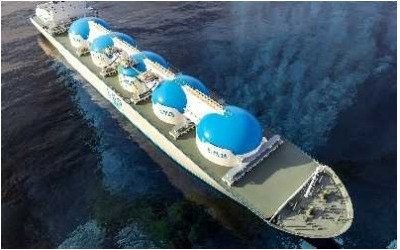Liquid Natural Gas (LNG) has emerged as a critical player in the energy landscape, and the United States has become a focal point for substantial LNG project activity. Understanding what LNG is, the dynamics of the LNG market, and its significance to the American economy is paramount as the nation navigates its energy future.
Understanding LNG: A Primer
LNG is natural gas that has been cooled to the point of liquefaction, transforming it into a clear, colorless, and non-toxic liquid. This process reduces the volume of the gas significantly, making it easier and more cost-effective to transport and store. The liquefaction process involves cooling natural gas to around -260°F (-162°C), converting it into a liquid state. This transformation not only reduces the volume by about 600 times but also makes it more suitable for long-distance transportation, primarily through specially designed LNG carriers.
The LNG Boom in the United States
The U.S. has witnessed a substantial surge in LNG projects, driven by various factors, including the shale gas revolution, global demand for cleaner energy sources, and advancements in liquefaction technology. The shale gas revolution, particularly in regions like the Permian Basin and the Marcellus Shale, has unlocked vast reserves of natural gas, making the U.S. a major player in the LNG market. The growth of LNG export terminals along the Gulf Coast, such as the Sabine Pass LNG Terminal in Louisiana and the Corpus Christi LNG Terminal in Texas, highlights the nation's commitment to leveraging its natural gas abundance for economic gains. These terminals serve as crucial hubs for liquefying and exporting natural gas to international markets, contributing significantly to the U.S. energy landscape. Key Players and Projects Several prominent players have spearheaded LNG projects, solidifying the U.S. as a major LNG exporter. Cheniere Energy, with its Sabine Pass and Corpus Christi LNG terminals, has been at the forefront of this transformation. Other players like Dominion Energy Cove Point LNG, Freeport LNG, and Cameron LNG have also played pivotal roles in expanding the country's LNG export capacity. The sheer scale of these projects is noteworthy. For instance, the Sabine Pass LNG Terminal has the capacity to produce over 30 million tonnes of LNG per year, making it one of the largest facilities of its kind globally. These projects not only contribute to domestic economic growth but also enhance the global energy trade landscape.
Economic Impact and Job Creation
The LNG boom in the U.S. has brought about a wave of economic benefits. These projects contribute significantly to job creation, both directly and indirectly. The construction and operation of LNG export terminals require a skilled workforce, ranging from engineers and technicians to logistics and administrative professionals. Additionally, the growth of associated industries, such as natural gas production, transportation, and equipment manufacturing, amplifies the positive economic impact.
Global Energy Security and Diplomacy
As the U.S. emerges as a major LNG exporter, it enhances its role in global energy security and diplomacy. LNG is a versatile energy source that can be used for power generation, heating, and as a feedstock for various industrial processes. By exporting LNG to nations seeking diverse and reliable energy sources, the U.S. strengthens diplomatic ties and plays a strategic role in supporting the energy needs of its allies.
Environmental Considerations
While LNG is often considered a cleaner-burning fuel compared to traditional hydrocarbons, there are environmental considerations. The extraction and production of natural gas, as well as the transportation of LNG, have environmental impacts that must be carefully managed. Balancing economic benefits with environmental stewardship is crucial to ensuring a sustainable and responsible approach to LNG development.
Conclusion: Shaping the Energy Future
In conclusion, LNG has become a linchpin in the U.S. energy strategy, offering economic benefits, job creation, and a substantial role in global energy dynamics. The growth of LNG projects along the Gulf Coast reflects the nation's commitment to leveraging its natural gas resources for domestic and international gains. As the U.S. continues to navigate its energy future, LNG stands as a cornerstone, contributing to economic prosperity, energy security, and strategic diplomacy on the world stage.
As the world continues to experience the effects of climate change, governments and organizations have made a lot of noise about reducing their greenhouse gas emissions and transition to cleaner forms of energy. How much of the talk turns into action will be critical for the future of our industry and our world.
Arash Roknian is leading Petroplan’s Clean Energy business in the US, as it becomes a larger part of the organization’s overall business model.
“As a recruiter, I’m drawn to clean energy because it represents a huge opportunity for innovation and economic growth,” says Arash.
“The clean energy sector is one of the fastest-growing industries in the world, with tremendous potential for job creation and economic development.”
Arash acknowledges that the pace of change can never be fast enough, given the urgency and what’s at stake.
“When we look at the progress that has been made so far, as well as some of the challenges that remain, it’s clear there’s a long way to go.”
One of the most significant signs of progress has been the rapid growth of renewable energy sources. According to the International Energy Agency, renewable energy sources such as wind and solar power accounted for 72% of global electricity generation capacity additions in 2020. This number continues to grow.
In fact, renewable energy sources are now the second-largest source of electricity worldwide. This growth has been driven by falling costs and government incentives, as well as increasing awareness of the need to address climate change.
Another positive development has been the increasing adoption of electric vehicles. While it’s still a small percentage of the overall vehicle market, sales of electric vehicles have been growing rapidly in recent years.
“We’re looking at up to 25% of new cars being electric by 2025,” Arash says.
“This growth is expected to continue as more automakers introduce new electric models and governments implement policies to encourage their adoption”
Despite these positive developments, there are still significant challenges in the energy transition. While renewable energy sources are growing rapidly, they still only account for a small percentage of total energy consumption.
“Another challenge is the need to upgrade and modernize electricity grids,” he says.
“Renewable energy sources such as wind and solar power are intermittent, meaning that they are not always available when needed. This requires a flexible and resilient electricity grid that can balance supply and demand in real-time.”
A major aspect of his team’s current activities is Hydrogen, where the US is making a huge push in development.
“It is a particularly exciting energy source for a number of reasons, including its high energy content, its versatility, and its potential to be produced from renewable sources.”
Hydrogen has a very high energy content per unit of weight, making it an extremely efficient fuel. It has three times more energy per unit of weight than gasoline, and when burned, it produces only water vapor as a byproduct. This makes hydrogen a very clean-burning fuel, with no emissions of pollutants or greenhouse gases.
Hydrogen is a very versatile energy source. It can be used in a variety of applications, including fuel cells for vehicles and power generation, industrial processes, and heating. It can also be used as a feedstock for the production of chemicals and other materials.
Hydrogen also has the potential to be produced from renewable sources such as solar, wind, and hydro power through a process called electrolysis. This involves using electricity to split water molecules into hydrogen and oxygen. When renewable energy is used to power the electrolysis process, the resulting hydrogen is completely carbon-free and emits no greenhouse gases.
Despite these challenges involved in production and storage, there is growing excitement around its potential as a clean, versatile, and efficient fuel.
Finally, there is the challenge of ensuring that the energy transition is equitable and just.
“The shift to renewable energy sources has the potential to create new jobs and economic opportunities, but it also has the potential to disrupt existing industries and communities. It is important that the transition is managed in a way that takes into account the needs and concerns of all stakeholders, including workers in the fossil fuel industry.”
Arash himself has been working in recruitment for ten years. After beginning his career in London, he transitioned to Houston four years ago, looking to take a role in one of the key battlegrounds of the energy transition.
“As a millennial, I’m acutely aware of the urgent need to address climate change and transition to a more sustainable, clean energy future. For me, working in clean energy is not just a job, it's a way to make a real difference and help build a better world.”
“Finally, I am drawn to clean energy because it offers the opportunity to work with a diverse range of people from different backgrounds and disciplines. The transition to clean energy is a complex, interdisciplinary challenge that requires collaboration and cooperation across a wide range of fields, from engineering and science to policy and finance. I believe that diverse teams are more innovative and effective, and I am excited about the prospect of working with people from different backgrounds and perspectives to find creative solutions to the challenges of the clean energy transition.”
The renewable energy sector will continue to grow in the coming years, with the potential to create up to 42 million jobs globally by 2050. However, this growth will depend on supportive policies and investment in the sector, as well as the continued development and deployment of renewable energy technologies.
“We’re all excited about the possibilities. We just need to make sure we’re moving fast enough.”
When Suzie joined Petroplan, in March 2013, she was just 18 months out of her master’s degree. It all started with a leap of faith – ‘Even though I hadn’t worked in HR before, they recognised that they could train me up and that I had other things to offer in the role.’
She fell right in the deep end from the beginning, with Petroplan introducing a new HR system at the time and her role varying from crafting carefully worded letters to reporting and basic coding, she had to learn quickly and immerse herself in all things HR.
Through her can-do attitude and natural curiosity, she gained her seniors’ trust early on and was allowed room to grow and discover more about the business; the people, the needs, the priorities. ‘It was a role that touched every aspect of HR, but also every bit of the business at every level.’
As part of Petroplan’s L&D programme, Suzie was offered to do a CIPD qualification course right at her interviewing stage; 6 months in her new role, and having acquired some practical knowledge, she decided to go for it; she was eligible for a CIPD level 7 diploma – ‘Every weekend would see me studying, learning, trying to absorb all this information so I was ready to pass the exams.’ And she did – with merits and distinctions!
While Suzie was growing professionally, Petroplan was growing along; halfway through her CIPD course and with the addition of a more junior member to the HR team, to cover Petroplan’s expansion needs, Suzie gets promoted to HR Advisor and takes on much of the day to day running of the HR department. Soon after that, Suzie gets a further promotion and becomes Petroplan’s HR Manager.
Having conquered that professional summit, it was time to start planning a personal one. With a slightly difficult start and a lot of support from Petroplan, Suzie becomes a mum for the first time in 2017. The birth of her first child sees her going on maternity leave and questioning her return to work. But Petroplan’s flexible working policy, offers her and her family an alternative solution, suitable to her new lifestyle.
‘The best decision I made was saying ‘yes’ to giving Petroplan two mornings a week after my son was born.’
Suzie gradually increased her hours with Petroplan until the birth of her second child in 2019. With the same high level of support from Petroplan, she came back from her second maternity leave and is now still at two and a half day weeks. This allows her to be with her children while getting involved with very interesting HR projects at Petroplan, like the roll out of a new HR system, the design and implementation of a global well being programme or the editing and circulation of Petroplan’s monthly People News. Suzie also finds time to volunteer with her local church – a precious commitment that so agrees with her character.
‘I feel so fortunate to have this balance, where I have my family life, my volunteering life and my work life…and I give a good amount of time to each thing.’
When discussing the future, she feels hopeful and optimistic; she loves the balance that she’s been allowed to achieve and is confident that, with her children growing up, she’ll still be able to enjoy professional progression without missing out on the dear family moments.
‘One thing I've learned in the past five years is that I don't have to give every waking minute and I don't have to work full time in order to grow a career.’
The flexibility, support and understanding she’s experienced so far has made her want to take a personalised approach to her interactions with the Petroplan people. As Global HR Manager, she has to deal with many difficult situations in people related matters and find a resolution which will suit both the individual and the business.
‘If you take the time to understand what the individual needs and what the business needs in detail, you can start to come up with a solution that works well for both; we won’t get it right every time…but it’s important to be honest with people and take time to explain and get them involved in the decisions.’
Her biggest lesson learnt so far and the advice she’d give to anyone starting out would be to set clear boundaries; to love the work you do but not let it creep into your personal life. To find something you love to do outside of work which will allow you to recharge and clear your mind.
Suzie loves people, words, and exciting new projects; she loves her job, her family and her volunteering work.
Suzie is an achiever, a thinker, and an objective advisor; she’s a professional, a working mum, a giving individual and Petroplan is her home!







You can also use your social account to sign in. First you need to:
To connect your social account you must Acknowledge the Terms & Conditions and Privacy Policy